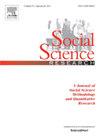Does relying on "close to home" information sources increase voter confidence? Evidence from the 2022 midterm elections
IF 3.5
2区 社会学
Q1 SOCIOLOGY
引用次数: 0
Abstract
Research shows that positive voter experiences shape public views about election integrity, especially confidence that votes are counted accurately. Local election officials (LEOs) play a key role in shaping these experiences. They run elections in voters' local jurisdictions, and are the authoritative sources of official, accurate, and timely information. Despite enjoying “close to home” status however, election officials may not be every voter's top information source for information about how to vote. In this paper, we argue that relying on "close to home" sources — local election offices, local or regional TV stations, and print publications — increases the chances voters are exposed to accurate information about how to vote, which translates into higher confidence in ballot accuracy. Drawing on a nationally representative survey of registered voters before the 2022 U.S. midterm elections, we find a positive relationship between these sources and voter confidence at personal, community, and state levels. This relationship holds even for integrity skeptics, such as Trump voters. While opting into “close to home” information ecosystems improves trust in elections, we note a key caveat: voters who rely on state election offices consistently report lower confidence. This suggests important nuances in how election officials are perceived by the public as trusted messengers in matters of election process and integrity.
依赖“离家近”的信息来源会增加选民的信心吗?2022年中期选举的证据
研究表明,积极的选民经历会影响公众对选举公正性的看法,尤其是对选票被准确计算的信心。地方选举官员(LEOs)在形成这些经验方面发挥着关键作用。他们在选民所在的地方管辖范围内进行选举,是官方、准确和及时信息的权威来源。尽管享有“离家近”的地位,但选举官员可能不是每个选民了解如何投票的首要信息来源。在本文中,我们认为,依靠“离家近”的信息来源——当地选举办公室、地方或地区电视台以及印刷出版物——增加了选民接触到有关如何投票的准确信息的机会,这转化为对选票准确性的更高信心。根据2022年美国中期选举前对全国登记选民进行的具有代表性的调查,我们发现这些来源与个人、社区和州层面的选民信心之间存在正相关关系。这种关系甚至适用于对诚信持怀疑态度的人,比如特朗普的选民。虽然选择“离家近”的信息生态系统可以提高对选举的信任,但我们注意到一个关键的警告:依赖州选举办公室的选民一直报告信心较低。这表明,在选举过程和诚信问题上,公众如何将选举官员视为值得信赖的信使,这其中存在着重要的细微差别。
本文章由计算机程序翻译,如有差异,请以英文原文为准。
求助全文
约1分钟内获得全文
求助全文
来源期刊

Social Science Research
SOCIOLOGY-
CiteScore
4.30
自引率
4.00%
发文量
0
审稿时长
65 days
期刊介绍:
Social Science Research publishes papers devoted to quantitative social science research and methodology. The journal features articles that illustrate the use of quantitative methods in the empirical solution of substantive problems, and emphasizes those concerned with issues or methods that cut across traditional disciplinary lines. Special attention is given to methods that have been used by only one particular social science discipline, but that may have application to a broader range of areas.
 求助内容:
求助内容: 应助结果提醒方式:
应助结果提醒方式:


